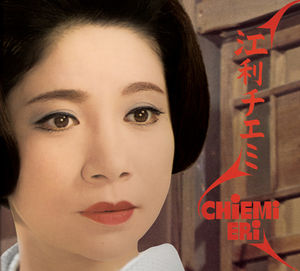
- Welcome to ImportCDs.com
- My Account
An Alliance Entertainment Company
Nasdaq: AENT
Show results forExploreIn StockArtistsActorsAuthorsFormatThemeCategoryGenreRatedLabelSpecialtyDecadesSizeColorDeals

|

Chiemi Eri[CD]~ Chiemi Eri
Backordered: Get it by
Fri. Feb 7
Deliver to
Product Notes
A magical mixture of traditional min'y? songs and Latin jazz elements. With it's second release, Akuphone continues to explore Asia with an original compilation of the work of Japanese singer Chiemi Eri, drawing upon 10s released by the Japanese King label between 1958 and 1962. Includes exclusive liner notes and a rich calligraphic booklet with Romanized lyrics. Chiemi Eri (1937-1982) grew up in a musical family and began a career as a singer on US military bases when still a teenager, becoming famous for her performances of classics from the American postwar musical repertoire. At the age of 14 she recorded the song Tennessee Waltz with King Records, which turned out to be the first of many successes. Chiemi Eri is one of the most famous Japanese singers of the 20th century, more precisely of the Sh'wa era (1926-1989) corresponding to the reign of Emperor Sh?wa, known outside Japan by his personal name Hirohito. Both a singer and an actress - she appeared in more than 50 films and many stage plays - Eri definitely made a mark on the Japanese postwar cultural landscape, along with fellow singer-actresses Izumi Yukimura and Hibari Misora (collectively nicknamed the three sisters). Their success can be connected to the cultural opening of Japan, which, although initiated a century before, accelerated with the US military occupation of the archipelago (1945-1952). This period saw the import of popular musical styles including jazz, bebop, swing, and mambo, as well as the development of the hybrid kay'kyoku style, a delicious mix of so-called Western music with Japanese music. The work of Chiemi Eri documented here combines vocal jazz, Latin rhythms, and Japanese folk in an original musical syncretism. Supported by Tadaaki Misago & Tokyo Cuban Boys, the oldest and most prolific Latin jazz group in Japan, Chiemi Eri sings themes, in Japanese, mainly taken from traditional folklore. Thus, the drums and brass of the Cuban arrangements are mixed with rich min'y folk songs, which celebrate every region, every local tradition, and every event with a particular song or dance. Chiemi Eri also reveals the vocal prowess specific to min'y, in particular the kobushi, a style of melisma (the technique of singing a single syllable of text while moving between several different notes in succession). Somewhere between Ella Fitzgerald and Celia Cruz, Chiemi Eri can also be associated with Serge Gainsbourg, who yielded to the mambo revolution as soon as the late 1950s.
Details
Credits
|
||||||||||||||||||||


